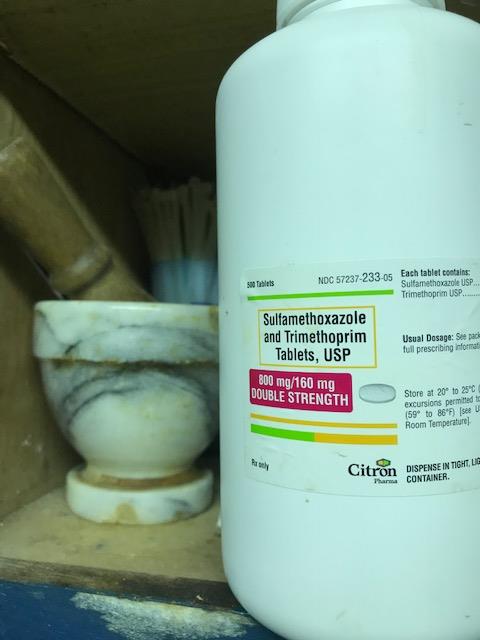
Photo: dimasobko/Adobestock
If you’ve got an old bottle of leftover antibiotics sitting in your tack room, it might be tempting to use it the next time you have a horse with an issue. But giving those antibiotics without a veterinary diagnosis and prescription could contribute to an issue that’s got veterinarians and human doctors concerned: antibiotic resistance.
“It’s definitely an issue, and it’s not just in the horse world,” said Dr. Michele Frazer of Hagyard Equine Medical Institute. “It’s an emerging issue over the last several decades. It’s an issue in the human world, as well, and our veterinary practices can affect the issue of antibiotic resistance in the human population. That’s the big concern.”
Here’s why. Bacteria can change, or mutate, over time. As they are exposed to different antibiotics, those mutations can help the bacteria become more effective at surviving—in other words, they can become resistant to the drugs that are supposed to kill them.
“When antibiotic resistance occurs, we can have development of what are called superbugs, or multi-resistant bacteria,” Frazer explained. “Those are bacteria that are resistant maybe not to all antibiotics, but to many of our commonly used antibiotics. If a person or an animal develops a disease from those bacteria, the treatment options are limited.”
This isn’t just hypothetical. Antibiotic resistance is a real problem that doctors and veterinarians are already dealing with in their patients.
“There are several multi-resistant superbugs that have emerged in the last few years,” Frazer said. “Two of the big ones that I’ve seen in the equine world are Clostridium difficile and MRSA [methicillin-resistant Staphylococcus aureus]. Both of these bacteria are found in the environment. The issue is that they have changed their drug-resistance until they are much harder to treat.
“Clostridium difficile causes gastrointestinal disease, and it can also cause kidney disease in horses and humans. As this bacteria has changed, it’s become harder to find antibiotics that are appropriate to treat it. For immuno-compromised people or people who have been in the hospital with another disease, a Clostridium difficile infection can be devastating.”
In 2014, the White House announced a National Strategy for Combating Antibiotic-Resistant Bacteria, and the FDA is working to educate consumers about the perils of drug-resistance and how it’s connected to inappropriate antibiotic use, both in humans and animals.
“They are trying to get it out there to the public,” Frazer said of the federal efforts.
“It’s important to remember that antibiotics aren’t benign,” cautioned Frazer. “Even aside from the drug resistance, they’re not benign. We can certainly see complications from them in any species, particularly the horse. A veterinarian’s job is to look at what is wrong with the horse, what they can define as the primary cause of the illness, and then decide which antibiotic is appropriate and if the benefit of using that antibiotic outweighs the potential side-effects of using an antibiotic.”
How You Can Help Prevent Antibiotic-Resistance
How you administer antibiotics to your horse—and how you yourself take them when they’re prescribed to you—can affect the risk level for antibiotic-resistance, which goes up with inappropriate or indiscriminate antibiotic use. Here’s how you can help.
1. DON’T give antibiotics without consulting your vet.
“Just because a horse has a fever or a horse isn’t quite right one day, you don’t necessarily give antibiotics,” Frazer said. “Unless you have a defined medical reason to start an antibiotic and a veterinarian working with

you, you don’t want to start antibiotics. You want to have a valid reason to treat with antibiotics. You also want your veterinarian on board, too, to make sure you’re using an appropriate dosage. Underdosing means you’re just suppressing the bacteria, not killing it.”
Get a veterinary diagnosis for a horse’s problem, even if you think you know what the diagnosis will be.
“There are certain types of pneumonia in the horse, like Rhodococcus pneumonia in foals, that respond to a select few antibiotics; the majority of our antibiotics aren’t going to respond,” Frazer explained. “So you need your veterinarian participating with you to define what your horse has and then choose the correct antibiotic. Putting the horse on a different antibiotic, first, is not going to help your horse, and, second, it’s an unnecessary use of an antibiotic that’s contributing to the development of drug-resistance.”
2. DO complete the entire course of antibiotics that your veterinarian has prescribed.
It might be tempting to stop giving your horse antibiotics once he’s looking and feeling better, but don’t give in to that temptation. If your vet has prescribed a two-week course of antibiotics and your horse seems great after 10 days, go on and finish out the full 14 days.
“What we don’t want to do is start an antibiotic protocol and not finish it,” Frazer said. “That basically suppresses the bacteria but doesn’t actually kill it. It just allows that bacteria a window to start mutating to a form that is going to be resistant to antibiotics.”
3. DO keep accurate weights for your horses to help ensure accurate dosages.
4. DON’T pre-emptively put all the horses in your barn on antibiotics thinking it’s good preventive medicine.
Consult with your veterinarian before putting any horse on antibiotics. Unnecessary antibiotic use in a healthy horse can contribute to resistance.
5. DON’T use antibiotics past their expiration dates.
These practices are important in the fight against antibiotic-resistant bacteria. So is research that can develop new ways to combat disease-causing bacteria.
“There is also ongoing research at many levels, including the National Institutes of Health, trying to combat drug-resistance and to develop new antibiotics,” Frazer said. “I think there’s hope. Research will give us more options, and at the same time we have to be judicious and do our part by not using antibiotics unnecessarily and, when antibiotic use is necessary, by making sure it’s the appropriate antibiotic choice and that we complete the course.”
Want more articles like this delivered to your inbox every week? Sign up here to receive our free Equestrian Weekly newsletter.
This article is original content produced by US Equestrian and may only be shared via social media. It is not to be repurposed or used on any other website aside from USequestrian.org.


